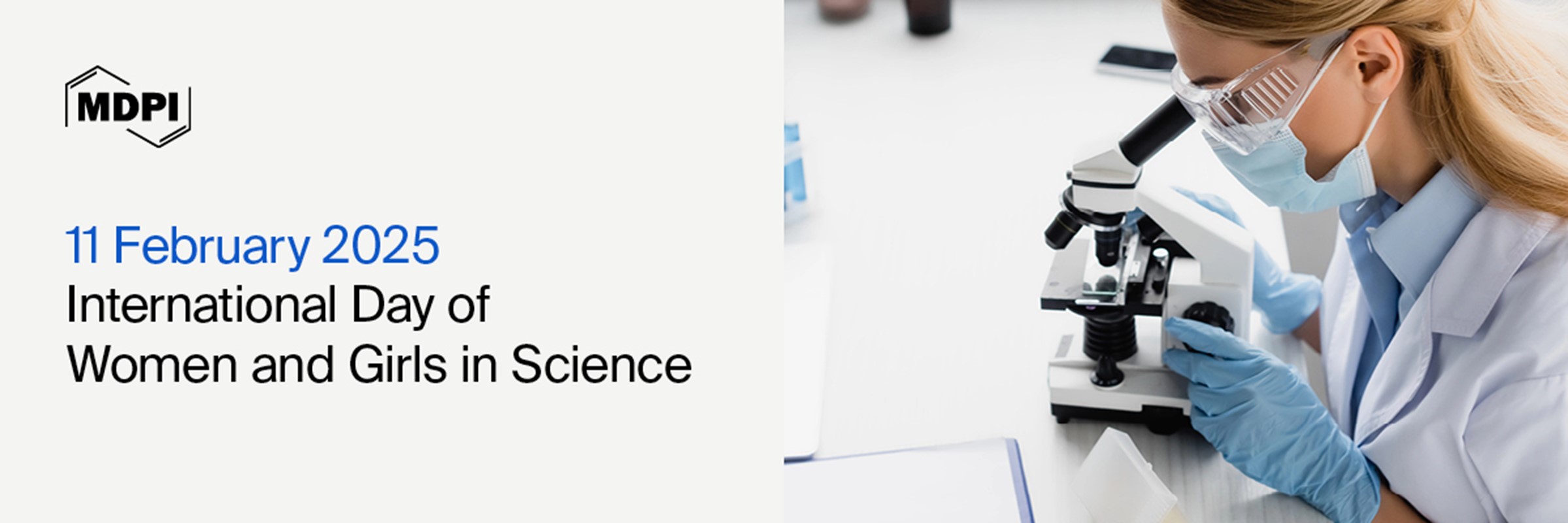
International Day of Women and Girls in Science—“Building a Future for Women in Science”
The International Day of Women and Girls in Science, celebrated annually on 11 February, highlights the vital role of women and girls in addressing prominent global challenges like climate change, public health, and sustainable development. The 2025 theme, “Building a Future for Women in Science”, emphasizes the need for greater gender equality in science, technology, engineering, and mathematics (STEM) to harness diverse talent and perspectives. Despite progress in education, a persistent gender gap limits female potential in these fields.
In recognition of the International Day of Women and Girls in Science, MDPI reaffirms its commitment to fostering equity and inclusion in STEM fields. We celebrate the achievements of women in science and highlight their vital contributions to advancing knowledge and innovation. Through open access publishing, MDPI ensures that groundbreaking research, including topics on gender equity and women in STEM, is accessible to practitioners, policymakers, and global audiences. By sharing inspiring stories of women in science and curating relevant publications, MDPI aims to inspire positive action and collaboration to create a more inclusive and equitable scientific community. Together, we celebrate progress while striving for a future where women and girls are empowered to thrive in science and beyond.


“How Important Are Labor-Market Gender Gaps in the South Caucasus?”
by Marc Teignier and David Cuberes
Economies 2024, 12(12), 332; https://doi.org/10.3390/economies12120332
“Empowerment and Sustainability: Investigating Barriers to Women’s Transition from Higher Education to Empowerment in Brazil”
by Muhammad Qasim Rana, Angela Lee, José Fernando Rodrigues Bezerra and Guilherme Hissa Villas Boas
Societies 2024, 14(11), 234; https://doi.org/10.3390/soc14110234
“Pregnancy, Childbirth, and Postpartum Experiences of Racialised Brazilian Women in Portugal: An Analysis of Obstetric Violence as Gender-Based Violence”
by Mariana Holanda Rusu, Conceição Nogueira and Joana Topa
Sexes 2024, 5(4), 611-637; https://doi.org/10.3390/sexes5040040
“In Their Own Words: Muslim Women Reconstruct the Sexual Script”
by Jennifer Lara Fagen
Sexes 2024, 5(4), 638-651; https://doi.org/10.3390/sexes5040041
“Liposomes and Their Therapeutic Applications in Enhancing Psoriasis and Breast Cancer Treatments”
by Amal Ali Elkordy, David Hill, Mohamed Attia and Cheng Shu Chaw
Nanomaterials 2024, 14(21), 1760; https://doi.org/10.3390/nano14211760
“Gender Typicality and Engineering Attachment: Examining the Viewpoints of Women College Engineers and Variation by Race/Ethnicity”
by Ursula Nguyen and Catherine Riegle-Crumb
Behav. Sci. 2024, 14(7), 573; https://doi.org/10.3390/bs14070573
“Epistemic Uncertainty, Social Dominance Orientation, and Prejudices toward Women in Leadership Roles: Mediation and Moderation Analyses”
by Federico Contu, Antonio Aiello and Antonio Pierro
Soc. Sci. 2024, 13(1), 54; https://doi.org/10.3390/socsci13010054
“Peptides Targeting HER2-Positive Breast Cancer Cells and Applications in Tumor Imaging and Delivery of Chemotherapeutics”
by Palmira Alessia Cavallaro, Marzia De Santo, Emilia Lucia Belsito, Camilla Longobucco, Manuela Curcio, Catia Morelli, Luigi Pasqua and Antonella Leggio
Nanomaterials 2023, 13(17), 2476; https://doi.org/10.3390/nano13172476
“Sources of Wellbeing Amongst Saudi Arabian Women Academic Leaders: An Explorative Study”
by Rasis Alanazi and Claire Alkouatli
Societies 2023, 13(4), 88; https://doi.org/10.3390/soc13040088
“Investigating the Status of Women Engineers in Education and Employment during the COVID-19 Pandemic”
by Seema Singh
Challenges 2022, 13(1), 27; https://doi.org/10.3390/challe13010027

|
“Sexual Double Standard: Prejudice in Gender and Sexual Orientation” |
“Gender-Inclusive Education and Teaching in STEM: Strategies, Challenges, and Contradictions” |









